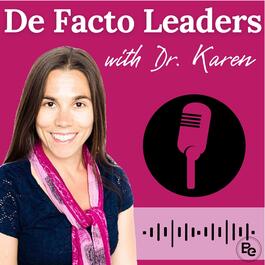
De Facto Leaders
On the De Facto Leaders podcast, host Dr. Karen Dudek-Brannan helps pediatric therapists and educators become better leaders, so they can make a bigger impact with their services. With over 15 years of experience supporting school-age kids with diverse learning needs, Dr. Karen shares up-to-date evidence-based practices, her own experiences and guest interviews designed to help clinicians, teachers, and aspiring school leaders feel more confident in the way they serve their students and clients. She’ll cover a range of topics designed to help you support students' emotional and academic growth and set kids up for success in adulthood, including how to support language, literacy, executive functioning, and how to help IEP teams working together to support kids across the day. Whether you want to learn more effective strategies for your therapy session or classroom, be a more influential leader on your team, or find creative ways to use your skills to advance in your career, Dr. Karen has you covered.
Show episodes
Every time I look into research on the summer slide, I get more confused. It’s no wonder professionals and families are scrambling every May as they think about how kids should be spending their time in the summer. I’ve intended to do a deep dive into the research and gain a better understanding of how significant the

What “Biologically Secondary” Means for Literacy Instruction (featuring Dr. Pamela Snow)
The idea that exposing kids to enriching literacy and play-based experiences will effectively teach them to read and write sounds nice on paper. Unfortunately, it’s not in-line with the large and growing body of evidence that suggests that kids need direct, explicit instruction to learn to read, write, and spell. Sure

The Relationship Between Language Skills and Discipline Referrals (featuring Dr. Shameka Stewart)
When schools respond to “behavior problems” in students, the focus is often on the symptom, not the cause. Failing to look beyond the surface behavior does a disservice to students, which is why in this episode I share commentary and a clip from my conversation with Dr. Shameka Stewart on the school-to-confinement pip
“We don’t need to work on decoding because students have access to assistive technology and accommodations.” “We don’t work on word-decoding in high school.” “Working on reading in high school is too little too late.” If you’ve ever heard any of these arguments, you’re not alone. Unfortunately, beliefs like these do st

Engaging Families and the Role of Tech in Addressing Book Deserts (featuring Cassandra Williams)
In this episode, I reflect on my conversation with my colleague Cassandra Williams as we discuss book and resource deserts, as well as how to engage with school communities. In the interview clip I share, Cassandra shares a story of how one of her colleagues found a surprising way to increase attendance at parent-teac
Ever feel overwhelmed being the only SLP in your district without a network of fellow clinicians for support? You're not alone; many in similar situations face these challenges. In this episode, I’m sharing a case study of an SLP who, despite being the sole clinician in her district, felt the pressure of not having a t